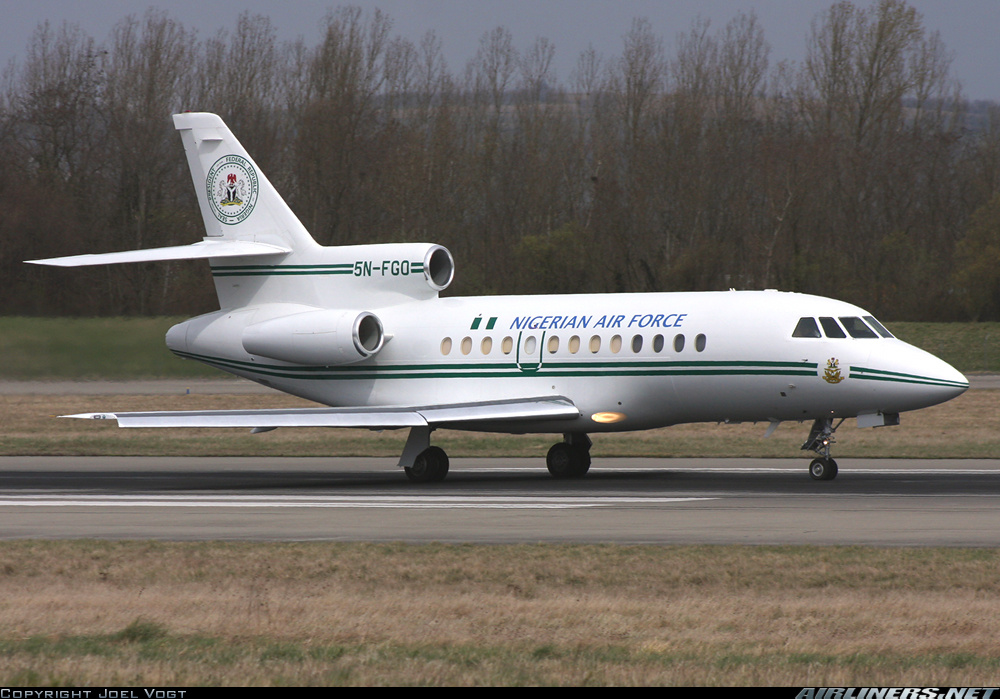The federal government seems to treat with levity the embarrassment the Ogun State Government has caused Nigeria with the seizure of three presidential jets and two houses abroad by a Chinese investment firm. Following judgments obtained from the London Arbitration Tribunal in 2021, and an enforcement order obtained from the Paris Judicial Court (Tribunal Judiciaire de Paris), Zhongshan Fucheng Industrial Investment Company Limited seized the aircraft as security for its claim of EUR74,459,221 euros (USD81,724,193) related to an award granted to the Chinese firm by ad hoc arbitral tribunal in London on March 26, 2021.
The presidential jets belonging to the Federal Republic of Nigeria include: one Falcon 7X, 5N-FGU (msn 090) parked at Paris Le Bourget; one B737-700(BBJ), 5N-FGT (msn 34260) located at Basel/Mulhouse/Freiburg, CH, where it was ferried to in March to be sold; and one ACJ330-200, 5N-FGA (msn 1053), recently bought from AMAC Corporate Jet (AMK, Zurich) and still stationed at Basel. Though one of the aircraft has since been released, the seizure was in line with the London tribunal ruling in Zhongshan’s favour, citing violations of investment treaty obligations. The tribunal awarded USD55.6 million in compensation plus USD75,000 in moral damages, USD9.4 million in interest calculated from July 2016, GBP2.8 million pounds (USD3.6 million) in legal costs, and GBP354,655 (USD456,148) in other arbitration costs. In the suit it filed, Zhongshan had claimed USD1.07 billion.
This would not be the first case involving a messy trade deal between Nigeria and so-called international companies. The case involving the Process & Industrial Developments Limited (P&ID) in 2017 nearly cost the country $11 billion compensation and interest payment. The government paid Global Infrastructure Holding Nigeria Limited, an Indian-firm, as much as $500 million over a similar judgment by a London Arbitration Court over the 2007 termination of contract for the concession of Ajaokuta Steel Company to Global Infrastructure. In addition to the cash payment, government was made to cede Itakpe Iron-Ore Company to the Indian firm, as an additional penalty. Again, Nigeria has been exposed to the latest humiliation because the Ogun State Government and its agents had treated the international trade dispute with the Chinese company with levity.
A former governor of Ogun State, Ibikunle Amosun, gave an explanation that showed clearly that in signing the Ogun Free Trade Agreement with Chinese firms in 2007, the agents of the state government were unclear about which of two Chinese companies had the responsibility of managing the outfit. Amosun claimed that there arose a dispute between Messrs China Africa Investment FXE and Zhongfu International Investment FXE, as to which of them should manage the Ogun-Guangdong Free Trade Zone (OGFTZ).
- As insecurity, climate crisis push 31.8m Nigerians into hunger
- Ethnicity, religion, not my problem — General Martin Luther Agwai (former Army Chief)
The former governor described the situation thus: “The business dispute and rivalry between the Chinese concerns soon became fierce, grounded seamless business activities and threatened public peace and safety within the Zone and neighbouring communities. There were claims and counter claims as to whom between the two was the lawful representative of the original joint venturer, Guangdong Province, China and consequentially who had the right to manage the Zone… Unknown to Ogun Government at the time, Zhongfu International Investment FXE merely sought to de-market China Africa Investment FXE and to surreptitiously convert the state-owned assets of Guangdong Province in China together with the Zone ownership and management rights of their business rival.”
Though governor narrated how Zhongshan’s efforts to take over the Free Trade Zone failed in Nigeria. It is apparent that the Ogun State Government demonstrated complacency on different fronts. First, why was it difficult for the state government to clearly articulate the separate roles that two Chinese firms would play in the written agreement? It took for granted the fact that the two Chinese companies were different entities, and permitted them to operate with overlapping roles until a bitter dispute erupted between them. The picture that unfolds is that of a state government that was not in control of a multibillion-dollar project in which it had committed the Ogun State people.
Secondly, we are shocked that the state government, having proved that Zhongshan had peddled lies that contaminated the integrity of the industrial agreement, it failed to follow the procedures for repudiating the earlier agreement by dragging the company to the London Arbitration Tribunal. Rather, it waited until Zhongshan took the initiative and humiliated, not just Ogun State Government, but also the Federal Government of Nigeria. It is shameful for a state government to sign a trade agreement with foreign companies without clearly understanding the terms of such agreement and knowing when one of the parties has violated the deal, in order to seek redress. This shows how government business is handled with levity.
As the federal government has stepped into this issue, using legal and diplomatic strategies, we insist that a thorough investigation must be launched into this careless approach to the trade agreement. Those found wanting must be punished. A Nigerian company cannot operate in China and breach an agreement with a Chinese subnational government, and exercise the effrontery to go to an international arbitration tribunal to claim damages. Officials of Ogun State Government must pay a penalty for this lackadaisical handling of the trade agreement.

 Join Daily Trust WhatsApp Community For Quick Access To News and Happenings Around You.
Join Daily Trust WhatsApp Community For Quick Access To News and Happenings Around You.


